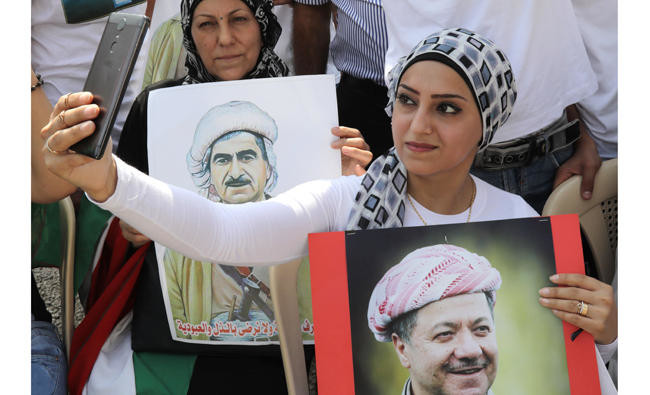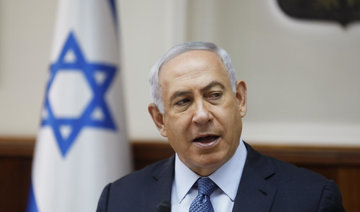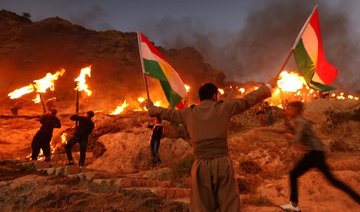JERUSALEM: Israel has become the only country to openly support an independent Kurdish state, a result of good ties between Kurds and Jews and expectations it would be a front against Iran and extremism, experts say.
Iraq’s Kurdish region plans to hold a non-binding referendum on statehood on Sept. 25 despite the objections of Baghdad and neighboring Iran and Turkey, as well as the US.
On Monday, Iraq’s Supreme Court ordered the suspension of the referendum as legal and political pressure mounted on the Kurds to call off the vote.
Israel became the first and so far only country to openly voice support for “the legitimate efforts of the Kurdish people to attain a state of its own,” as Prime Minister Benjamin Netanyahu said last week, without specifying where and how.
Netanyahu’s statement came after remarks made earlier in the month by former general Yair Golan, who said he liked the “idea of independent Kurdistan.”
“Basically, looking at Iran in the east, looking at the instability (in) the region, a solid, stable, cohesive Kurdish entity in the midst of this quagmire — it’s not a bad idea,” Golan said at the Washington Institute for Near East Policy.
He also noted Israel’s “good cooperation with the Kurd people since the early 1960s.”
To Gideon Saar, a former Israeli minister, the Kurds are a minority group in the Middle East that, unlike the Jews, have yet to achieve statehood.
“The Kurds have been and will continue to be reliable and long-term allies of Israel since they are, like us, a minority group in the region,” he said.
“We need to encourage independence of minorities that were wronged by regional arrangements since Sykes-Picot over the past 100 years and have been repressed under authoritarian regimes, like Saddam Hussein’s in Iraq and the Assads in Syria,” Saar said.
The Sykes-Picot agreement was a World War I-era deal between Britain and France laying out boundaries in the Middle East.
Saar too noted Kurdistan’s efforts in pushing back Islamist forces.
“Looking at the Kurds’ location on a map you realize they can be a dam blocking the spread of radical Islam in the region, and in practice we’ve seen them exclusively fighting IS,” he said.
“Throughout the years the Kurds were never drawn to anti-Israeli or anti-Zionist perceptions and maintained good ties with the Jewish people and Israel.”
Ofra Bengio, who heads a Kurdish studies program at Tel Aviv University, noted that Israel supplied covert military, intelligence and humanitarian aid to Kurdistan in the years 1965-1975.
When Jews living in Iraqi cities were subject to harassment under Baath rule in the early 1970s, Kurds smuggled them out of the country to safety, she said.
Former Kurdish leader Mustafa Barzani visited Israel, as did his son, current president of the Iraqi Kurdistan region Massud Barzani, and many Israeli officials have visited Kurdistan, Bengio said.
“I don’t know to what extent (Kurdistan) could be an ally since it would be pressed by all kinds of Arab factors, but at least it won’t be hostile toward Israel. That’s certain,” said Bengio, author of the book “The Kurds of Iraq: Building a State Within a State.”
“What’s more important, it would be a buffer against extremist elements — not just Iran, but also others,” she said, noting IS and Iraqi Shiite militias.
A Kurdistan which emphasises “secularity, democracy, moderation and acceptance of the other” would be “a positive element in a region that is becoming increasingly extremist and unstable,” Bengio said.
The US supports the current Kurdish autonomy in northern Iraq and relies on its forces in the war against Daesh, but has urged the Kurds to call off the potentially “provocative and destabilising” independence referendum.
To Saar, the former minister, Israeli leader Netanyahu should “use our leverage in the US to strengthen the Kurds in a very crucial moment of their national struggle.”
Israel sees benefits in independent Kurdistan: Experts
Israel sees benefits in independent Kurdistan: Experts

Israel destroys Hezbollah tunnel, met with calls for popular resistance

- Secret crossing routes link Damascus to Beirut
- Sixty-seven Syrians deported
BEIRUT: The Israeli military announced its “success in dismantling an underground tunnel in southern Lebanon, measuring 100 meters in length, leading to a hideout belonging to the Radwan Forces of Hezbollah.”
Israeli forces, which have been infiltrating the border area in southern Lebanon since Oct. 1 continue to operate in the country despite the ceasefire agreement, with Saturday marking the beginning of the second month of the specified withdrawal deadline.
While the Israeli military justified its hostile activities in southern Lebanon as “removing threats in line with the ceasefire understandings between Israel and Lebanon,” it said that “the 300th Brigade, in cooperation with the 146th Division and engineering forces, successfully dismantled the mentioned tunnel.”
It added that “the specialized Yahalom Unit, dealing with explosives, secured and inspected the tunnel for threats. During the operations, large quantities of weapons were discovered inside the tunnel, including rifles, machine guns, anti-tank missiles, as well as advanced surveillance systems. All the equipment was confiscated and destroyed, including the tunnel itself.”
The statement mentioned “the discovery of a stockpile of anti-tank missiles and heavy machine-gun positions directed toward Israeli sites near the tunnel.” It also noted that “the tunnel’s path led to a Hezbollah command center containing rocket launch platforms previously used against Israel during the war, as well as large quantities of explosives.”
While the Israeli military continues to encroach upon the border area and prevents residents from accessing the area until further notice in an attempt to establish a buffer zone, anonymous statements circulated on social media calling for “popular resistance.”
Activists supportive of Hezbollah criticized the Lebanese Army and state for not responding to the Israeli incursions into towns and villages and demanded that Hezbollah “arm and train us so we can resist the Israeli occupier and liberate our land with our own hands.”
A statement signed by a group calling itself Youth of the Border Villages declared: “We find ourselves compelled to defend our villages and properties with whatever weapons are available, and we will not accept the continuation of this barbaric, systematic, and brutal aggression by the enemy. We will be forced to launch a southern popular resistance to confront this assault.”
Another statement signed by a group called Youth of Beirut’s Southern Suburb called on “the Islamic Resistance in Lebanon, represented by Hezbollah, to fight in defense of the land, the people, and honor.”
The statement referred to the Israeli violations that occurred after the ceasefire agreement was announced and stated that “given what has happened, after consulting with the Lebanese state and receiving no response, and consulting UNIFIL without receiving any answer, we hereby legally, morally, and ethically authorize Hezbollah and demand it to arm and train us so we can resist the Israeli occupier and liberate our land with our own hands.”
However, despite these anonymous calls, the caretaker government, in which Hezbollah is a key partner, continues to affirm its commitment to the “ceasefire agreement and its insistence on implementing Resolution 1701 as a means to stop hostilities against Lebanon.”
Meanwhile, Hezbollah continues to hold funerals for members killed in southern Lebanon.
During the funeral of one in the city of Hermel on Saturday, Hezbollah MP Ihab Hamadeh condemned “the repeated Israeli violations of the ceasefire agreement.” He held “the Lebanese government and the committee overseeing the implementation of the ceasefire accountable,” asserting that “resistance remains the most effective option to confront the Israeli enemy.”
On the other side of the border, the Lebanese General Security deported 67 Syrians who had entered Lebanese territory illegally through Al-Arida border crossing with Syria in the north.
In a statement, the Internal Security Forces announced that they had “intercepted a bus carrying the Syrians in the Jbeil area. Upon inspection, 67 individuals were found on board, including men, women, and children, one of whom was an infant no older than 40 days. They had been smuggled into Lebanon from Syria to be transported to Beirut.”
Meanwhile, media reports cited a Lebanese security source stating that “Rifaat Assad, uncle of the ousted Syrian president Bashar Assad, departed Beirut Rafic Hariri International Airport for Dubai on Tuesday afternoon, accompanied by two individuals on a private jet.”
On Friday, Lebanese General Security detained Rifaat Assad’s granddaughter and her mother at the airport after discovering both were carrying passports that had expired.
Numerous former Assad regime officials have left the country via Lebanon since the fall of the regime. Among those was Bouthaina Shaaban, a senior adviser to the deposed leadership , according to Interior Minister Bassam Mawlawi.
However, security services arrested a former officer from the 4th Division, belonging to Syria’s Al-Kreidi family, while he was en route to Beirut with $170,000 in his possession.
Meanwhile, security forces are still investigating whether the former head of Syrian Air Force Intelligence, Jamil Hassan — accused by US authorities of committing war crimes during Assad’s rule — is currently in Lebanon.
The Lebanese judiciary received an Interpol request for his arrest, and Prime Minister Najib Mikati affirmed at the time that Lebanon “will cooperate with Interpol’s request.”
Arab Parliament describes Israeli assault on Gaza hospital as ‘war crime’

- Attack is latest in ‘ongoing series of atrocities’ against Palestinians, it says
- Body calls for end to ‘international silence,’ as crisis worsens
LONDON: The Arab Parliament has denounced Israel’s burning of Kamal Adwan Hospital in the northern Gaza Strip on Friday as “a new war crime,” following reports that patients, injured civilians and medical staff were forced to evacuate under perilous conditions.
According to witnesses, Israeli troops stormed the hospital, setting large sections ablaze, detained its director and ordered the evacuation of hundreds to the nearby Indonesian Hospital.
The displaced individuals were left in dire conditions, lacking food, water, electricity and medical supplies, witnesses said.
The assault rendered the facility “useless,” worsening Gaza’s already severe health crisis, the Palestinian territory’s health officials said on Saturday.
In a statement on Saturday, the Arab Parliament described the incident as “a flagrant violation of international humanitarian law” and called for those responsible to be brought before international courts.
“This crime is added to an ongoing series of atrocities by the occupation forces against Palestinian civilians,” it said.
The Arab Parliament accused Israel of systematically targeting Gaza’s already fragile health infrastructure and said the international community’s silence had emboldened these actions.
“The persistence on the total and complete destruction of the dilapidated health system in the Gaza Strip is a direct result of international silence on its crimes,” it said.
The statement urged the UN Security Council and broader international community to take action, calling for an immediate ceasefire, accountability for alleged war crimes and measures to prevent further humanitarian catastrophes in Gaza.
Babies freezing to death due to cold weather and lack of shelter in Gaza, says UNRWA chief

- Philippe Lazzarini issued stark warning about dire humanitarian situation in Gaza
LONDON: Freezing temperatures and a lack of basic supplies in Gaza are threatening lives amid Israel’s ongoing assault on the enclave, a United Nations official warned on Saturday.
Philippe Lazzarini, commissioner-general of the UN Relief and Works Agency for Palestine Refugees in the Near East, issued a stark warning about the dire humanitarian situation in Gaza, where he said babies and infants were succumbing to the cold due to the region’s harsh winter weather and inadequate shelter.
“Meanwhile, blankets, mattresses, and other winter supplies have been stuck in the region for months waiting for approval to get into Gaza,” Lazzarini wrote on X.
He also emphasized the urgent need for the immediate provision of essential winter supplies and reiterated calls for a ceasefire to allow humanitarian aid to reach those in need.
The World Food Program has also highlighted the worsening hunger crisis in Gaza. The agency reported that it has only managed to deliver about a third of the food required to support the population.
“Hunger is everywhere in Gaza,” the WFP stated in a post on X. The agency echoed calls for the restoration of law and order, safe and sustained humanitarian access, and an immediate ceasefire to alleviate the suffering.
UN agencies continue to urge swift international action to address the urgent needs of Gaza’s vulnerable population.
Egypt completes trial run of new Suez Canal channel extension

- Suez Canal Authority says two ships passed through a new stretch of the canal’s two-way section
- Revenue from the waterway has plunged since Yemen’s Houthi militants began attacking vessels in the Red Sea
CAIRO: Egypt said on Saturday it had successfully tested a new 10km channel near the southern end of the Suez Canal, even as its revenue from the waterway has plunged since Yemen’s Houthi militants began attacking vessels in the Red Sea.
The Suez Canal Authority said in a statement that during a trial run two ships passed through a new stretch of the canal’s two-way section without incident.
Following the 2021 grounding of the container ship Ever Given that blocked the vital waterway for six days, Egypt accelerated plans to extend the second channel in the southern reaches of the canal and widen the existing channel.
Its revenue from the waterway, the gateway to the shortest route between Europe and Asia, has nevertheless tumbled since Yemen’s Houthi militants began attacking ships in the Red Sea in November 2023 in what they say is solidarity with Palestinian militants in Gaza.
Egyptian President Abdel Fattah El-Sisi said on Thursday that due to “regional challenges,” the country had lost approximately $7 billion in Suez Canal revenue in 2024, marking more than a 60 percent drop from 2023.
According to the Suez Canal Authority, the latest expansion extends the total length of the canal’s two-way section to 82 km from a previous 72 km. The canal is 193 km long in total.
“This expansion will boost the canal’s capacity by an additional 6 to 8 ships daily and enhance its ability to handle potential emergencies,” the Suez Canal Authority said in its statement.
Earlier this year, Egypt said that it was considering an additional expansion project separate to the 10 km channel extension.
Houthi rebels say new air raids hit northern Yemen

- Houthis say raids hit the Buhais area of Hajjah province’s Medi district
SANAA: Yemen’s Iran-backed Houthi rebels said new air raids hit the country’s north on Saturday, shortly after they claimed responsibility for a missile attack on Israel.
A Houthi military statement said the raids were carried out in the Buhais area of Hajjah province’s Medi district, blaming “US-British aggression.”
There was no immediate comment from London or Washington.
The Houthis made the same claim about a raid they said hit a park in the capital Sanaa on Friday.
Hostilities have also flared between the rebels and Israel in recent days after a series of Houthi missile attacks prompted deadly Israeli air strikes in rebel-held areas on Thursday.
Six people were killed, including four at Sanaa airport, where World Health Organization chief Tedros Adhanom Ghebreyesus was waiting for a flight.
On Saturday, the Houthis claimed they had “successfully” targeted the Nevatim base south of Jerusalem with a ballistic missile.
The Israelis had earlier said a missile launched from Yemen was shot down.
The Houthis, part of the “axis of resistance” of Iran-allied groups, have been firing at Israel and ships in the Red Sea and Gulf of Aden in solidarity with Palestinians since the war in the Gaza Strip broke out last year.






















